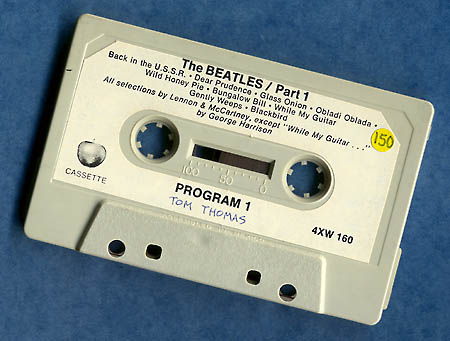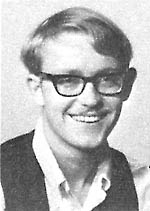Ringo
Written April 30, 2002
I came late to the Beatles Revolution.
When I first heard of the British quartet called the Beatles in 1964, I was a student in high school. But I was not one to follow the latest trends. That year I penned a quatrain:
Far sweeter than the wailing of this age,
Discordant noise to which we twist and rock,
Rings forth old music from the yellowed page:
The songs of Schubert and the fugues of Bach.
I tended to reflect my parents' values, and our family was more Tennessee Ernie Ford and Pat Boone that it was rock and roll. To us, "long-hair musicians" were classical icons like Franz Liszt (right), not moptops with loud electric guitars and screaming fans.
However, the times were changing, and longer hair was gradually becoming the fashion. In our hometown, where Ink Monroe and Jim Parker owned Ink and Jim’s Barber Shop, Parker would be forced into retirement by the end of the decade. “Back then, customers came in every two or three weeks for a haircut,” he told the Richwood Gazette. “But when the Beatles arrived, people got their hair cut three or four times a year. I couldn’t raise a family with three children on the loss of income.”
A recent ABC documentary on the Beatles observed that appearance signals attitude. The Beatles' long hair signaled disobedience — a break with one's parents. But I was no juvenile delinquent. I was quite happy to agree with my family.
In 1965, however, I went off to Oberlin College and became a sportscaster on the campus radio station, WOBC. Eventually I took on other roles at the station, which led to my spinning Beatles tunes.
The Radio Voice of Oberlin College
WOBC divided its hours equally between classical and popular music. Much of the staff worked either for the classical department or for the pop department — with the exception of a few of us who spent far too much time at the station and ended up wearing many hats.
Classical announcers tended to be students in Oberlin's Conservatory of Music. They selected their music a couple of weeks in advance so that it could be listed in our Program Guide. On the air, they introduced the records, and engineers played them. I was one of those engineers.
Pop music announcers tended to be from the College of Arts and Sciences, and they usually spun their own disks. I, too, tried my hand at disk jockeying on the daily Sunrise! program. I came in one morning a week and played what everyone else was playing, including Beatles records.
Diverse Tunes
I was already somewhat familiar with the Sergeant Pepper album; in my dorm, the guys next door played it over and over. Many of those songs were on WOBC's unwritten playlist.
From time to time, new Beatles singles were released, and these 45's automatically became enormously popular and part of our Top 40 repertoire.
Then the "White Album" came out, and we DJ's found it a trove of treasures. Almost every cut on this double album was outstanding, and no two were alike.

I remember remarking on the air one day, "Now this next record is a brand-new release from Gary Puckett and the Union Gap. I haven't played it yet, so you and I are going to be hearing it for the first time together. But I already know pretty much what it's going to sound like, because — let's face it — all of Gary Puckett's records sound pretty much the same. In contrast, you have a group like the Beatles. Part of their greatness is the variety of their music. A new Beatles song is always a pleasant surprise."




To jump ahead to the early 1970s, WMRN, the local radio station where my parents lived, sometimes played "Let It Be." With accompaniment from a piano and a Hammond organ, it almost sounded like a hymn. "When I find myself in times of trouble, Mother Mary comes to me, speaking words of wisdom: let it be. . . . There will be an answer; let it be." My mother had already heard this song a few times when the announcer happened to mention that it was by the Beatles. She was quite surprised.
Great Songs
The folk/pop singer Judy Collins came to Oberlin for Homecoming Weekend in 1968. We had often played her hit "Both Sides Now" on our station, and she included many other songs in her October 20 concert at Finney Chapel. Afterwards I remarked to Jan Olson that, for some reason, the one I happened to like best was "In My Life." Jan objected, "But that's just an old Beatles song." "I know," I replied, "but it's a good one."
As it turned out, in 2001 a poll of songwriters chose "In My Life" as the greatest song ever written. I don't know if it's that good, but I enjoyed hearing Judy Collins sing it in 1968.
In the Sixties, others were expressing extravagant opinions on the excellence of the Beatles oeuvre. Paul McCartney’s simple ballad "Yesterday" was often singled out for praise. One of our classical music hosts wasn’t buying it. "Yeah, sure," he remarked sarcastically, invoking the name of one of the supreme lyric baritones of the 20th century, "just let me know when Dietrich Fischer-Dieskau releases his recording of 'Yesterday.'"
Serious Marathons
At WOBC, my sports department sometimes aired a live game on Saturday afternoon or evening. But in general, those hours were filled with classical music. In the afternoon we carried the live broadcast from the Metropolitan Opera in New York (even though the sound quality wasn't very good because there were no high-quality telephone lines to bring the signal into Oberlin). In the evening was "3157," named for the station's campus phone number. We took telephone requests for classical music, which allowed us to break free from the the station's rigidly planned format and play anything that struck someone's fancy.
The Metropolitan Opera season concluded in April. We more than filled the gap on May 18, 1968, when, as requested by 500 of our listeners, we played a complete recording of the "Ring Cycle." These four operas by Richard Wagner dramatize a connected story nearly 16 hours long. On WOBC, the Ring Cycle aired (with three intermissions) between 7:00 in the morning and midnight, and a new tradition was born.
Another tradition had been established for several years already: the Classical Music Marathon at the end of each semester. For more than a week, we aired nothing but classical music 24 hours a day, allegedly as a background for students who were cramming for final exams. Almost everyone on the staff signed up for a DJ shift. We could play anything we liked, and we ourselves could get a lot of studying done during a half-hour LP side.
When I arose early on June 6, 1968, I turned on my radio. Ted Gest happened to be hosting the marathon, and he passed along the latest reports about the condition of Sen. Robert F. Kennedy. That was how I learned that Kennedy had been shot in Los Angeles.
Pop Copycats
During my senior year, the pop music department decided that there ought to be a Popular Music Marathon as well. I took a shift, but I couldn't resist "breaking the marathon" by playing a Mozart cut.
|
|
Then one of our disk jockeys, Dave Webster, decided that the pop department should have its own epic. As I recall, this was in January 1969. For the first time, Oberlin was going to have an unstructured "Winter Term" between the fall and spring semesters, and for this month WOBC's usual format was suspended as well. Dave took advantage of this informality to play, with some help, in alphabetical order, every song the Beatles ever recorded. And what did he call his extravaganza? Naturally, it was the "Ringo Cycle." |

